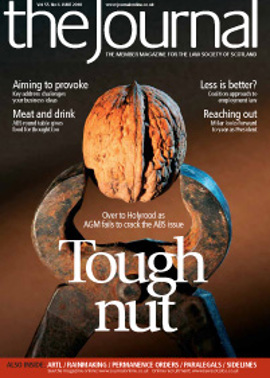Win some, lose some

The attention of the agricultural world has, recently, been on the Land Court where the hearing in the latest litigation involving Messrs Morrison-Low and Paterson has been taking place (the first review of rent under a 1991 Act lease to be undertaken by the court since the passing of the 2003 Act). The court’s decision, expected reasonably soon, will set the parameters for the future, including the treatment of single farm payment and the value of LDT and SLDT as comparable evidence.
More of that anon, but it is to the Court of Session that I turn my attention, the Inner House having issued its decisions in two appeals against orders by the Land Court, with mixed fortunes for the lower forum.
Point not taken
In The Colstoun Trust v AC Stoddart & Sons [2010] CSIH 20, the Inner House (on 23 March 2010) upheld the Land Court’s ruling (7 August 2008) exercising its discretion not to admit adjustments dated 21 May 2008 (in an application which had commenced on 26 November 2004).
This included a preliminary plea challenging the court’s jurisdiction to fix a new rent on the ground that there had been a variation of rent within the three years preceding the review date, in the form of a small rent reduction following a resumption.
The higher court supported the Land Court’s view that unfairness to the tenant would result if the adjustments, including the preliminary plea, were to be allowed, and observed that, when the proposed adjustments were lodged, the case had been in dependence for nearly four years. It went on to point out that the landlord had already prolonged the litigation by taking a groundless preliminary plea (that the rent should be fixed on the basis of what was fair and reasonable as between the parties to a continuing lease), which was refused, reversing the Land Court’s earlier decision, on 1 June 2007, and that the preliminary plea now sought was on a point that could have been taken at the start.
Were it to be allowed, the landlord would have delayed the conclusion of the proceedings even further, it being (in the court’s opinion) undesirable that rent reviews should remain unresolved long after the review date, in this case 28 November 2004. This was, in the court’s view, not in the interests of justice and was likely to affect the quality of the evidence to be provided in a rent review.
The application has accordingly, for the second time, been sent back to the Land Court to fix the rent, which the tenants have been trying to have fixed for the last seven years.
The Inner House went on to consider whether the Land Court had been correct in issuing an obiter dictum to the effect that, in its view, a minimal reduction in rent following a resumption did not amount to a review of rent within the meaning of s 13(8), and cautioned the Land Court for having expressed a view on a doubtful point, however tentative that view, without having heard a full argument or held an inquiry into the facts. The court reserved its position in these matters.
Terms defined
In Forbes v Cameron [2010] CSIH 25 the Inner House (on 1 April 2010) reversed the Land Court’s order dated 27 October 2008, in which the Land Court had held that the term of “Whitsunday”, which was undefined for the purposes of the ish of the lease, fell to be interpreted in the context of the lease as a whole and that, because the lease defined “Whitsunday” as “15 May” in the rent payment clause, it had the same meaning for the purpose of a notice to quit.
The higher court was very clear that the definition of “Whitsunday”, where it was used without specification as to the date or month, in relation to the ish, began and ended with s 1(4) of the Term and Quarter Days (Scotland) Act 1990, and that it was irrelevant that it had been defined in another section of the lease. The notice to quit served against 28 May was, accordingly, upheld as valid.
The forthright decision of the Inner House in this matter will, I am sure, allow those practitioners who (like me) have advised clients, consistently, between 1990 and 2008 that, where the terms “Whitsunday” and “Martinmas” are not specifically defined in the lease, they mean 28 May and 28 November, respectively, as a result of the 1990 Act, to sleep more easily at night!
- Alasdair G Fox, Anderson Strathern LLP
Update
Since this article was prepared, there have been further appeal decisions in Loudon v Hamilton (appeal by grazing tenant claiming secure tenancy, refused), and Mount Stuart Trust v McCulloch (appeal by landlord against refusal of irritancy, also refused). These will feature in a future article.
In this issue
- Embrace "the new lawyer", mediation expert will tell conference
- Best practice governance for family businesses: a new dawn
- Spanning the divide
- Action on Gill review
- A House divided?
- Get it right first time
- Views from the front line
- Push for change
- "If ABSs are the answer, what's the question?"
- Common cause
- Shaping a new life
- Essential artl
- Smart bows out at AGM
- It's the final countdown
- Law reform update
- Ask Ash
- Here comes the rain again...
- True or false?
- Journey's end
- Win some, lose some
- Forget getting paid!
- Thumbs up for Google?
- A sporting result?
- Buying into good causes
- Scottish Solicitors' Discipline Tribunal
- Website review
- Book reviews






